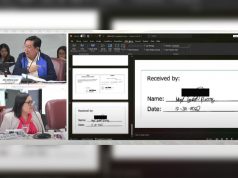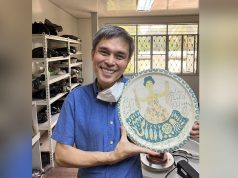
(Updated 6:06 p.m.) Vice President Leni Robredo teamed up with an international direct-selling business to provide food for locally stranded individuals and street dwellers in different parts of the country.
LSIs are those who stranded or stuck in Metro Manila and other parts of Luzon when the tough lockdowns were implemented last March to supposedly help curb the spread of the novel coronavirus which causes COVID-19 in the country.
The Office of the Vice President and Amway Philippines, a US-based company selling beauty, home and health care products, distributed over P300,000 worth of care packages to Filipinos from Manila North Port, Sta. Cruz Manila, Paco Manila, Delpan, and Quezon Memorial Circle.
Both the OVP and Amway also distributed 2,000 hot meals to the recipients who have little to no access to food due to the novel coronavirus pandemic.
“Our commitment to help individuals’ lead healthier and more empowered lives is not just for our customers and partners, but to all Filipinos especially those who need it most,” said Leni Olmedo, country manager of Amway Philippines in a statement.
In an email, Amway Philippines says the donation “is part of the company’s mission to uplift Filipinos and help them lead healthier and more empowered lives.”
“There is no political implication in this and it is simply one of the actions Amway Philippines has taken so far to help the country fight the coronavirus disease,” it adds.
Besides the partnership with the Office of the Vice President, the company teamed up with the Philippine Red Cross and the Department of Education.
The ‘networking’ businesses: Pyramids, MLMs or direct-selling?
Good intentions to assist during a pandemic aside, Amway has been subject to investigations in the United States after it was alleged to be a pyramid scheme.
Investopedia said an illegal pyramid scheme’s structure is where “a few top-level members recruit newer members, who pay upfront costs up the chain, to those who enrolled them. As newer members in turn recruit underlings of their own, a portion of the subsequent fees they receive is also kicked up the chain.”
An MLM, on the other hand, operates by selling products through layers of distributors. Critics of MLMs, most famously including Emmy-winning host John Oliver, say the two models have no difference at all.
“Almost all of these schemes tell you that you can make money by just recruiting… let’s say five. Then you do the five do their five, that gives you 25. What they don’t show you is that you could only do that 13 cycles and you would exceed the population of the earth,” says Robert Fitzpatrick, a critic and author of “False Profits” that examines the psychological, social and financial effects of MLMs.
Endlessly increasing the number of distributors is not inherent to the business of regular retail companies whose products are found in stores. Critics point out that constant downline recruitment characteristic to an MLM’s structure makes its business model unsustainable and not beneficial to a majority of its sellers who are recruited later.
Amway had constantly denied allegations that its operations are “pyramiding” in disguise, noting that direct-selling is legal.
“In a 1979 ruling that stands today, Amway was recognized by the United States’ Federal Trade Commission as a legitimate direct selling business whose distributors sell quality products to consumers, and where no one earns income unless products are sold. This ruling is used by nations around the world as they established regulations for the direct selling industry,” its website reads.
In an followup email to Interaksyon, Amway Philippines maintains that it does not consider itself a multilevel marketing company or a pyramid scheme but a direct-selling company.
“Amway is a responsible direct selling company that has been setting the standard in the industry for decades. In contrast to MLM’s or Pyramid Schemes, Direct Selling companies earn their revenue from product sales,” its clarificatory statement reads.
Unlike pyramid schemes, “Amway focuses on retailing and marketing their products as the primary source of revenue. It doesn’t have any revenue or commission from the recruitment of its direct sellers into their respective Amway businesses,” it continues.
It also states that there are no revenues from the P1,000 signup fee charged to new “Amway business owners” or ABOs as it includes P1,000 voucher. “Thus signing up is free of charge,” it says.
Other sources such as Investopedia, the New York Times and the attorney general’s office in Michigan characterize Amway as a legitimate company that employs multilevel marketing.
Multilevel marketing “is a lawful and legitimate business method that uses a network of independent representatives to sell consumer products,” the attorney general’s website notes. To be considered legal, “compensation must primarily be based on the sale of products and services to the ultimate consumer.”
Other MLMs followed the Amway model in the legal direct-selling business. To date, Amway is the top direct-selling company in the world with revenues of $8.5 billion in 2019.
Robredo’s pandemic-time activities
Robredo and her Angat Buhay program proactive throughout the pandemic in launching various initiatives to help health workers, LSIs and other Filipinos affected by the pandemic on the sidelines of the national government’s response efforts.
[A] Maraming salamat sa Peculiar Eyewear with Ces Drilon, para sa handog nilang 2,000 na piraso ng full protective face…
Posted by VP Leni Robredo on Wednesday, September 30, 2020
Since March this year, the OVP took the lead and offered free rides to employees, particularly the health workers and other front liners, following the suspension of mass transport last March.
Her team also provided them free temporary dormitories, personal protective equipment and other medical supplies.
The OVP last April also managed to raise almost P60 million worth of COVID-19 relief to further aid thousands of Filipinos amid the still raging global health crisis. — reports from Catalina Ricci Madarang









